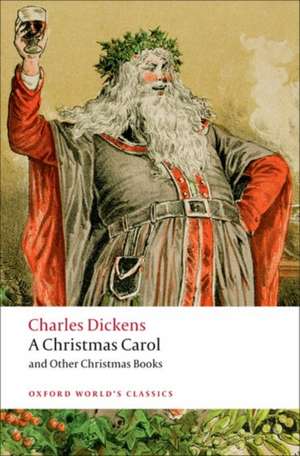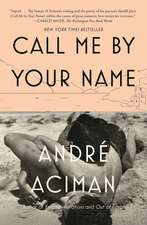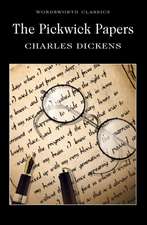A Christmas Carol: and Other Christmas Stories: Oxford World's Classics Hardback Collection
Autor Charles Dickens Editat de Robert Douglas-Fairhursten Limba Engleză Hardback – 27 sep 2018
Din seria Oxford World's Classics Hardback Collection
-
 Preț: 155.26 lei
Preț: 155.26 lei - 15%
 Preț: 82.81 lei
Preț: 82.81 lei - 15%
 Preț: 92.18 lei
Preț: 92.18 lei - 16%
 Preț: 90.65 lei
Preț: 90.65 lei - 16%
 Preț: 91.50 lei
Preț: 91.50 lei - 14%
 Preț: 94.84 lei
Preț: 94.84 lei - 14%
 Preț: 94.42 lei
Preț: 94.42 lei - 15%
 Preț: 81.47 lei
Preț: 81.47 lei - 14%
 Preț: 84.14 lei
Preț: 84.14 lei - 15%
 Preț: 98.84 lei
Preț: 98.84 lei - 14%
 Preț: 95.72 lei
Preț: 95.72 lei - 13%
 Preț: 113.60 lei
Preț: 113.60 lei - 14%
 Preț: 106.86 lei
Preț: 106.86 lei - 10%
 Preț: 116.20 lei
Preț: 116.20 lei - 14%
 Preț: 94.23 lei
Preț: 94.23 lei - 14%
 Preț: 95.28 lei
Preț: 95.28 lei - 15%
 Preț: 82.81 lei
Preț: 82.81 lei - 13%
 Preț: 96.25 lei
Preț: 96.25 lei - 16%
 Preț: 80.21 lei
Preț: 80.21 lei - 14%
 Preț: 94.11 lei
Preț: 94.11 lei
Preț: 95.30 lei
Preț vechi: 110.69 lei
-14% Nou
Puncte Express: 143
Preț estimativ în valută:
18.24€ • 19.04$ • 15.09£
18.24€ • 19.04$ • 15.09£
Carte disponibilă
Livrare economică 03-10 martie
Livrare express 28 februarie-06 martie pentru 50.62 lei
Preluare comenzi: 021 569.72.76
Specificații
ISBN-13: 9780198822394
ISBN-10: 0198822391
Pagini: 496
Ilustrații: 20 black & white illustrations
Dimensiuni: 144 x 223 x 42 mm
Greutate: 0.61 kg
Editura: OUP OXFORD
Colecția OUP Oxford
Seria Oxford World's Classics Hardback Collection
Locul publicării:Oxford, United Kingdom
ISBN-10: 0198822391
Pagini: 496
Ilustrații: 20 black & white illustrations
Dimensiuni: 144 x 223 x 42 mm
Greutate: 0.61 kg
Editura: OUP OXFORD
Colecția OUP Oxford
Seria Oxford World's Classics Hardback Collection
Locul publicării:Oxford, United Kingdom
Recenzii
Another brilliant edition of the timeless classic.
A lovely new hardback edition from Oxford World's Classics. It's beautifully produced, with some of the original illustrations for each story, and is one of those volumes that is a physical pleasure to read... Id say it is perfect Christmas gift material for any Dickens fan, except Id never be willing to give my copy away!
A lovely new hardback edition from Oxford World's Classics. It's beautifully produced, with some of the original illustrations for each story, and is one of those volumes that is a physical pleasure to read... Id say it is perfect Christmas gift material for any Dickens fan, except Id never be willing to give my copy away!
Notă biografică
Robert Douglas-Fairhurst is the author of Becoming Dickens (Harvard UP, 2011), winner of the 2011 Duff Cooper Prize, and has edited editions of Dickens's Great Expectations, Henry Mayhew's London Labour and the London Poor, and Kingsley's The Water-Babies for Oxford World's Classics. He writes regularly for publications including the Daily Telegraph, The Guardian, TLS, and the New Statesman.
Textul de pe ultima copertă
In October 1843, Charles Dickens heavily in debt and obligated to his publisher began work on a book to help supplement his family's meager income. That volume, "A Christmas Carol, "has long since become one of the most beloved stories in the English language. As much a part of the holiday season as holly, mistletoe, and evergreen wreaths, this perennial favorite continues to delight new readers and rekindle thoughts of charity and goodwill.
With its characters exhibiting many qualities as well as failures often ascribed to Dickens himself, the imaginative and entertaining tale relates Ebenezer Scrooge's eerie encounters with a series of spectral visitors. Journeying with them through Christmases past, present, and future, he is ultimately transformed from an arrogant, obstinate, and insensitive miser to a generous, warmhearted, and caring human being. Written by one of England's greatest and most popular novelists, "A Christmas Carol" has come to epitomize the true meaning of Christmas."
With its characters exhibiting many qualities as well as failures often ascribed to Dickens himself, the imaginative and entertaining tale relates Ebenezer Scrooge's eerie encounters with a series of spectral visitors. Journeying with them through Christmases past, present, and future, he is ultimately transformed from an arrogant, obstinate, and insensitive miser to a generous, warmhearted, and caring human being. Written by one of England's greatest and most popular novelists, "A Christmas Carol" has come to epitomize the true meaning of Christmas."
Extras
MARLEY was dead: to begin with. There is no doubt whatever about that. The register of his burial was signed by the clergyman, the clerk, the undertaker, and the chief mourner. Scrooge signed it: and Scrooge's name was good upon 'Change, for anything he chose to put his hand to. Old Marley was as dead as a door-nail.
Mind! I don't mean to say that I know, of my own knowledge, what there is particularly dead about a door-nail. I might have been inclined, myself, to regard a coffin-nail as the deadest piece of ironmongery in the trade. But the wisdom of our ancestors is in the simile; and my unhallowed hands shall not disturb it, or the Country's done for. You will therefore permit me to repeat, emphatically, that Marley was as dead as a door-nail.
Scrooge knew he was dead? Of course he did. How could it be otherwise? Scrooge and he were partners for I don't know how many years. Scrooge was his sole executor, his sole administrator, his sole assign, his sole residuary legatee, his sole friend and sole mourner. And even Scrooge was not so dreadfully cut up by the sad event, but that he was an excellent man of business on the very day of the funeral, and solemnised it with an undoubted bargain.
The mention of Marley's funeral brings me back to the point I started from. There is no doubt that Marley was dead. This must be distinctly understood, or nothing wonderful can come of the story I am going to relate. If we were not perfectly convinced that Hamlet's Father died before the play began, there would be nothing more remarkable in his taking a stroll at night, in an easterly wind, upon his own ramparts, than there would be in any other middle-aged gentleman rashly turning out after dark in a breezy spot—say Saint Paul's Churchyard for instance—literally to astonish his son's weak mind.
Scrooge never painted out Old Marley's name. There it stood, years afterwards, above the warehouse door: Scrooge and Marley. The firm was known as Scrooge and Marley. Sometimes people new to the business called Scrooge Scrooge, and sometimes Marley, but he answered to both names: it was all the same to him.
Oh! but he was a tight-fisted hand at the grindstone, Scrooge! a squeezing, wrenching, grasping, scraping, clutching, covetous old sinner! Hard and sharp as flint, from which no steel had ever struck out generous fire; secret, and self-contained, and solitary as an oyster. The cold within him froze his old features, nipped his pointed nose, shrivelled his cheek, stiffened his gait; made his eyes red, his thin lips blue; and spoke out shrewdly in his grating voice. A frosty rime was on his head, and on his eyebrows, and his wiry chin. He carried his own low temperature always about with him; he iced his office in the dog-days; and didn't thaw it one degree at Christmas.
External heat and cold had little influence on Scrooge. No warmth could warm, nor wintry weather chill him. No wind that blew was bitterer than he, no falling snow was more intent upon its purpose, no pelting rain less open to entreaty. Foul weather didn't know where to have him. The heaviest rain, and snow, and hail, and sleet, could boast of the advantage over him in only one respect. They often 'came down' handsomely, and Scrooge never did.
Nobody ever stopped him in the street to say, with gladsome looks, 'My dear Scrooge, how are you? when will you come to see me?' No beggars implored him to bestow a trifle, no children asked him what it was 'oclock, no man or woman ever once in all his life inquired the way to such and such a place, of Scrooge. Even the blindmen's dogs appeared to know him; and when they saw him coming on, would tug their owners into doorways and up courts; and then would wag their tails as though they said, 'no eye at all is better than an evil eye, dark master!'
But what did Scrooge care? It was the very thing he liked. To edge his way along the crowded paths of life, warning all human sympathy to keep its distance, was what the knowing ones call 'nuts' to Scrooge.
Once upon a time—of all the good days in the year, on Christmas Eve—old Scrooge sat busy in his counting-house. It was cold, bleak, biting weather: foggy withal: and he could hear the people in the court outside, go wheezing up and down, beating their hands upon their breasts, and stamping their feet upon the pavement-stones to warm them. The city clocks had only just gone three, but it was quite dark already: it had not been light all day: and candles were flaring in the windows of the neighbouring offices, like ruddy smears upon the palpable brown air. The fog came pouring in at every chink and keyhole, and was so dense without, that although the court was of the narrowest, the houses opposite were mere phantoms. To see the dingy cloud come drooping down, obscuring everything, one might have thought that Nature lived hard by, and was brewing on a large scale.
The door of Scrooge's counting-house was open that he might keep his eye upon his clerk, who in a dismal little cell beyond, a sort of tank, was copying letters. Scrooge had a very small fire, but the clerk's fire was so very much smaller that it looked like one coal. But he couldn't replenish it, for Scrooge kept the coal-box in his own room; and so surely as the clerk came in with the shovel, the master predicted that it would be necessary for them to part. Wherefore the clerk put on his white comforter, and tried to warm himself at the candle; in which effort, not being a man of a strong imagination, he failed.
From the Paperback edition.
Mind! I don't mean to say that I know, of my own knowledge, what there is particularly dead about a door-nail. I might have been inclined, myself, to regard a coffin-nail as the deadest piece of ironmongery in the trade. But the wisdom of our ancestors is in the simile; and my unhallowed hands shall not disturb it, or the Country's done for. You will therefore permit me to repeat, emphatically, that Marley was as dead as a door-nail.
Scrooge knew he was dead? Of course he did. How could it be otherwise? Scrooge and he were partners for I don't know how many years. Scrooge was his sole executor, his sole administrator, his sole assign, his sole residuary legatee, his sole friend and sole mourner. And even Scrooge was not so dreadfully cut up by the sad event, but that he was an excellent man of business on the very day of the funeral, and solemnised it with an undoubted bargain.
The mention of Marley's funeral brings me back to the point I started from. There is no doubt that Marley was dead. This must be distinctly understood, or nothing wonderful can come of the story I am going to relate. If we were not perfectly convinced that Hamlet's Father died before the play began, there would be nothing more remarkable in his taking a stroll at night, in an easterly wind, upon his own ramparts, than there would be in any other middle-aged gentleman rashly turning out after dark in a breezy spot—say Saint Paul's Churchyard for instance—literally to astonish his son's weak mind.
Scrooge never painted out Old Marley's name. There it stood, years afterwards, above the warehouse door: Scrooge and Marley. The firm was known as Scrooge and Marley. Sometimes people new to the business called Scrooge Scrooge, and sometimes Marley, but he answered to both names: it was all the same to him.
Oh! but he was a tight-fisted hand at the grindstone, Scrooge! a squeezing, wrenching, grasping, scraping, clutching, covetous old sinner! Hard and sharp as flint, from which no steel had ever struck out generous fire; secret, and self-contained, and solitary as an oyster. The cold within him froze his old features, nipped his pointed nose, shrivelled his cheek, stiffened his gait; made his eyes red, his thin lips blue; and spoke out shrewdly in his grating voice. A frosty rime was on his head, and on his eyebrows, and his wiry chin. He carried his own low temperature always about with him; he iced his office in the dog-days; and didn't thaw it one degree at Christmas.
External heat and cold had little influence on Scrooge. No warmth could warm, nor wintry weather chill him. No wind that blew was bitterer than he, no falling snow was more intent upon its purpose, no pelting rain less open to entreaty. Foul weather didn't know where to have him. The heaviest rain, and snow, and hail, and sleet, could boast of the advantage over him in only one respect. They often 'came down' handsomely, and Scrooge never did.
Nobody ever stopped him in the street to say, with gladsome looks, 'My dear Scrooge, how are you? when will you come to see me?' No beggars implored him to bestow a trifle, no children asked him what it was 'oclock, no man or woman ever once in all his life inquired the way to such and such a place, of Scrooge. Even the blindmen's dogs appeared to know him; and when they saw him coming on, would tug their owners into doorways and up courts; and then would wag their tails as though they said, 'no eye at all is better than an evil eye, dark master!'
But what did Scrooge care? It was the very thing he liked. To edge his way along the crowded paths of life, warning all human sympathy to keep its distance, was what the knowing ones call 'nuts' to Scrooge.
Once upon a time—of all the good days in the year, on Christmas Eve—old Scrooge sat busy in his counting-house. It was cold, bleak, biting weather: foggy withal: and he could hear the people in the court outside, go wheezing up and down, beating their hands upon their breasts, and stamping their feet upon the pavement-stones to warm them. The city clocks had only just gone three, but it was quite dark already: it had not been light all day: and candles were flaring in the windows of the neighbouring offices, like ruddy smears upon the palpable brown air. The fog came pouring in at every chink and keyhole, and was so dense without, that although the court was of the narrowest, the houses opposite were mere phantoms. To see the dingy cloud come drooping down, obscuring everything, one might have thought that Nature lived hard by, and was brewing on a large scale.
The door of Scrooge's counting-house was open that he might keep his eye upon his clerk, who in a dismal little cell beyond, a sort of tank, was copying letters. Scrooge had a very small fire, but the clerk's fire was so very much smaller that it looked like one coal. But he couldn't replenish it, for Scrooge kept the coal-box in his own room; and so surely as the clerk came in with the shovel, the master predicted that it would be necessary for them to part. Wherefore the clerk put on his white comforter, and tried to warm himself at the candle; in which effort, not being a man of a strong imagination, he failed.
From the Paperback edition.
Cuprins
Author's Preface Preface Characters A Christmas Carol Stave I: Marley's Ghost Stave II: The First of the Three Spirits Stave III: The Second of the Three Spirits Stave IV: The Last of the Spirits Stave V: The End of It Editorische Notiz Literaturhinweise Nachwort



























